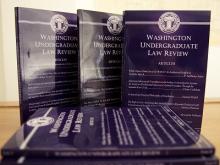Unsurprisingly for an LSJ major, senior Juliya Ziskina is ambitious.
Ziskina has been involved with the Washington Undergraduate Law Review since her freshman year, and is now serving as editor-in-chief. After years of effort on the part of her and other students, the publication is now really getting some traction.
“This year, I’m looking to distribute it more to top libraries or law libraries across the U.S., and maybe even internationally,” she said.The WULR is a registered student organization (R.S.O.) of the University of Washington. It solicits articles from other students all across the nation, and is published every quarter. A collection of about thirty students gather together every quarter, split into groups and go to work editing the articles to publishing quality.
“For some reason, I like editing papers, “said Henry Seeley, a junior applying to LSJ who has been with the law review five quarters. “It helps my own writing, first of all, and the papers are quite interesting.”
During their weekly meetings, members get into their groups, which usually consist of six to ten people, and work on the article they have been assigned. They nitpick grammatical problems, tweak sentence structure and sometimes have a back-and-forth with the original authors to clarify the content.
“A lot of the skills are very transferable. You don’t necessarily have to be a legal student to apply good writing skills,” said Ziskina. They talk through the concepts of the papers in their groups. Since the edits pertain more to grammar and sentence structure, the skills learned from those can be used across all subjects.
The students also use blue book format, the preferred method in law school, for their citations.
The group of students that make up the law review goes beyond the students you’d expect. It is not just LSJ students who dream of going to law school – there are political science majors, English majors, a couple natural science students and even an electrical engineer.
The topics covered are just as diverse as the students who edit them. According to Ziskina, the group has covered things from human rights to natural sciences to technology. There has even been an article about the connection between street art and free speech. The one connection among all the articles? They all deal with the law.
Even with such a wide range of topics, LSJ students have still been able to find overlaps between the work they take home from the law review and the subjects they cover in class.
“Almost every paper I’ve read has had some sort of application within a class or has added to a class,” Seeley said. The article he edited for the WULR this past fall quarter dealt heavily with positivism. As soon as he started one of his LSJ classes this quarter, positivism was something that was discussed.
Amanda Lukens, who graduated from the LSJ program last spring, participated in the law review for her last two quarters at school.
“Our meetings were always really… nerdy,” Lukens said with a laugh. People enjoyed editing at every meeting, she said, and members would joke around with one another about grammar and other edits.
Lukens thinks that having the law review on her resume may have even helped her land her current job. She works at a law firm and her boss, an English major, had seen the law review as part of Lukens’s extracurricular activities, and asked her to bring in some writing samples.
“It’s nice to learn [the skills], because I probably wouldn’t have otherwise,” said Emily Lore. She’s a freshman at the UW this year, and she quickly became acclimated to the law review group. Since she plans to apply for LSJ soon, she was excited to be able to spend her time in such a diverse group.
“I liked it because of the wide variety of ages,” she said.
Ziskina said her favorite part of being in the group is seeing the final product.
“It’s a good reminder of what we’ve been working toward,” she said. “Seeing the final PDF of the journal and all the fancy citations is what I think is the most rewarding.” She laughed when she said, “It’s beautiful.”
If you want to be part of the law review, look into joining at the beginning of the next quarter. Since it is a quarterly publication, potential members are discouraged from jumping in after groups have already been set for editing articles.
To learn more about the group, visit them online here.
This article was composed by Kristine Kim.
